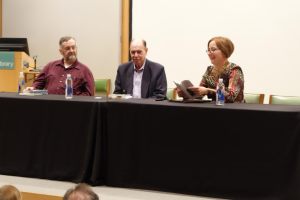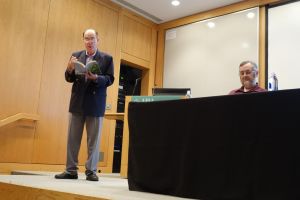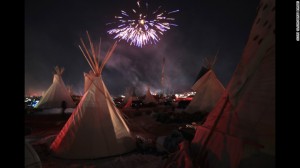In an essay still forthcoming in Hourglass Literary Magazine (see 8/17/16 blog), I speak of certain “small graces” that help us wade through whatever intervening darkness might otherwise engulf and drag us down in life. Indeed, for those readers accustomed to these occasional scribblings of mine, it will come as no surprise that the electoral results of November 8 did send me into one of those spirals toward the Land of Despond, although my intuition had been warning me all along that it might well happen. When it did, I was more disheartened than really surprised.
So I ask those of my readers who might have voted for Herr Trump—for whatever variety of motives; with hopeful heart or held nose—to indulge me any signs of that honest discontent while I give thanks for the small graces that do continue appearing to me. Which give me reason, as well as strength, to struggle on.
First, to those closest to me who were my initial support:
- Anita, near tears of her own and startled by mine, who hurried to notify our daughters and son that their father needed comforting (I had been trying to express in words the sadness I felt for all the children who were already so fearful of the wall that might soon separate them from their parents—all the more since watching Jorge Ramos’s documentary, Hate Rising, on my computer the previous night: his interview with a classroom of those children, in particular; and also with some white supremacists just up the road from me inPaoli, Indiana—the virulence and unreason of their hatred, pre-existent but newly vindicated by authoritarian demagoguery, so overwhelming);

- My daughters, both of whom answered, for my sake, their mother’s call to share a dinner out with us the following evening: Stephanie, conscientious and empathetic social-work therapist, who also cried that night thinking of her own unorthodox family (two wives/mothers, one teenage son), the struggling people she counsels, and so many others, known to her and unknown; and her sister, Nadina, who marveled at the ubiquitous and vindictive Facebook rants of otherwise kind, generous, loving, even upright and church-going people;
- Their brother, Jonathan, who called me on the phone from his home three hours north in Indianapolis; and who sent a card bearing a message about love—received a couple of days later—from that radical dreamer John Lennon;
- My vivacious and good-hearted cousin, Jeri Lynn, to whom Jonathan had confided on Facebook that I was feeling low, who also sent me a card with her own personal sentiments of shared commiseration and condolence; as well as the women of the Southern Indiana Writers group who, whatever the content of their individual perspectives and politics, lifted my spirits at our weekly Thursday-evening meeting—
But then, on November 29, the event I have been leading up to: on a stage on the Indiana University-Purdue University Indianapolis campus (IUPUI)—I, American-Argentine poet Luis Alberto Ambroggio, and fellow translator Ana Ona—in front of an auditorium full of almost two hundred people, mostly students, where we discussed and read from two of Ambroggio’s recent books; as my readers may know, the one that I translated for him (who I met that evening in person for the first time) is Todos somos Whitman/We Are All Whitman, his Latin American response to the “Song of Myself” and tribute to that Great Bearded Bard, published this year by Arte Público Press in Houston, Texas.
I had been to the Lilly Auditorium before, visiting it about five years ago with Buenos Aires writer María Rosa Lojo to discuss and read from both versions of her novel La pasión de los nómades, or Passionate Nomads (Aliform Publications, 2011). And now, for this second time, I was invited by Professor Rosa Tezanos-Pinto, whose published work includes a separate anthology of literary criticism about each of those writers’ work; and who also edited an impressively thick volume of roughly thirty years of Ambroggio’s poetic production.
To say that this was a moment of no small grace for me is perhaps an understatement. I would say, in fact, that no single book event that I have participated in has been a bigger one.
Why? For the gracious enthusiasm of this group of students, for one thing, several of whom shook my hand and thanked me effusively for my contribution and for even being there; and who later, after the meal that they had prepared in honor of the three of us (each dish representing the country of their families’ origins), were among those purchasing the Whitman book and asking for mine and Luis Alberto’s autographs.
And then—not to mention the usual graciousness of Dr. Tezanos-Pinto and her husband, José Vargas-Vila—there was Liz Goodfellow, friendly university employee (and non-Spanish speaker) who had arranged our hotel accommodations; and who also asked me, with credible signs of having been touched by my translations, if I wouldn’t also sign her copy.
So with all of that, in particular hers and others’ repeated and insistent praises, like Don Quixote after an unexpected victory I may have gotten a slightly inflated head. But not to worry: it was only a mildly intoxicating feeling, not on the whole unhealthy and, if I may say so, quite delightful. When I fell asleep a short time later in its fragrant mists, just imagine that it was into the most pleasant dreams of literary glory; and which appear, after all, to have done me no lasting harm.
#
Speaking of unlikely Quixotic victories, can it be possible that, as I was composing the rough draft of these words last night, the Standing Rock Sioux scored at least a temporary victory against my good knight’s evil magicians and the determined capitalists and enforcers of the Dakota Access Pipeline? Who had so lately taken to showering them—water protectors, or agitators, or “bad, bad people,” as I seem to recall our triumphant president-elect having characteristically dismissed them—with blasts of icy water in already sub-freezing temperatures? Blowing off an arm, here, with a concussion grenade, and taking out an eye, there, with a rubber bullet, for good measure?

Militarized police drenching peaceful water protectors in freezing weather, during a protest against plans to pass the Dakota Access pipeline near the Standing Rock Indian Reservation, near Cannon Ball, North Dakota, U.S. November 20, 2016. REUTERS/Stephanie Keith
To protect them from the ravages of hypothermia, I suppose; so that now, to prevent that from happening to them (or for whatever official reasons or unofficial intentions), the Army Corps of Engineers decides to call for the environmental study that may or may not force the “big snake” of the oil barons to direct its path around Native lands—as it had already been re-routed before from Bismarck, with far less spectacle and show of force, when the good and respectably white residents of that city had previously petitioned.
For such graces large and small, in any case, let us rejoice! And lay praises on the brave community of nonviolent resisters who fought on in the great tradition of their ancestors—as well as of Henry David Thoreau, the Mahatma Gandhi, and Martin Luther King, Jr.
And, from however near or far they came, those others from the populous and diverse United States of America and beyond, including those who just sent money, made phone calls, or wrote letters; but none more so than the courageous American veterans of foreign wars, whether of Native or Immigrant stock, who came this time by the thousands to really defend the freedoms (for perhaps their first time) of the American people.
So let’s not allow the dividers to divide us, my good neighbors and kith and kin, from those who might become our faithful allies. Together with whom, if we dare imagine it, through whatever darkness may lie ahead, we might still become the more united … mutually reliant and peaceable … and truly democratic people that our better angels would have us be.
Blessèd, as scripture says, be the uniters and the peacemakers!








Flagged to read tomorrow At a metal show for Hear Hear One week’s work has taken site from 25 daily readers to 750!
Sent from my iPhone
>
Thanks for reminding us of “small graces”, Brett. As a great man once taught us,
“The arc of the moral universe is long, but it bends towards justice.” (MLK)
Best regards,
Ron
Ronald Pies
Brett,
Thank you so much for reminding us all of the small victories; the small, but deeply important, pleasures, both personal and national. I should also say that I am happy and heartened that in these truly horrifying – but as you say quite unsurprising – times, you were able to savour that small head-swelling moment of literary fame and the love of your family!
All the best
Liam
Thanks, Liam. Always great to hear from you.
This is great, Brett. Your insights inspire me.
Lots of love and blessings this dark holiday season.
jm
Thank you!